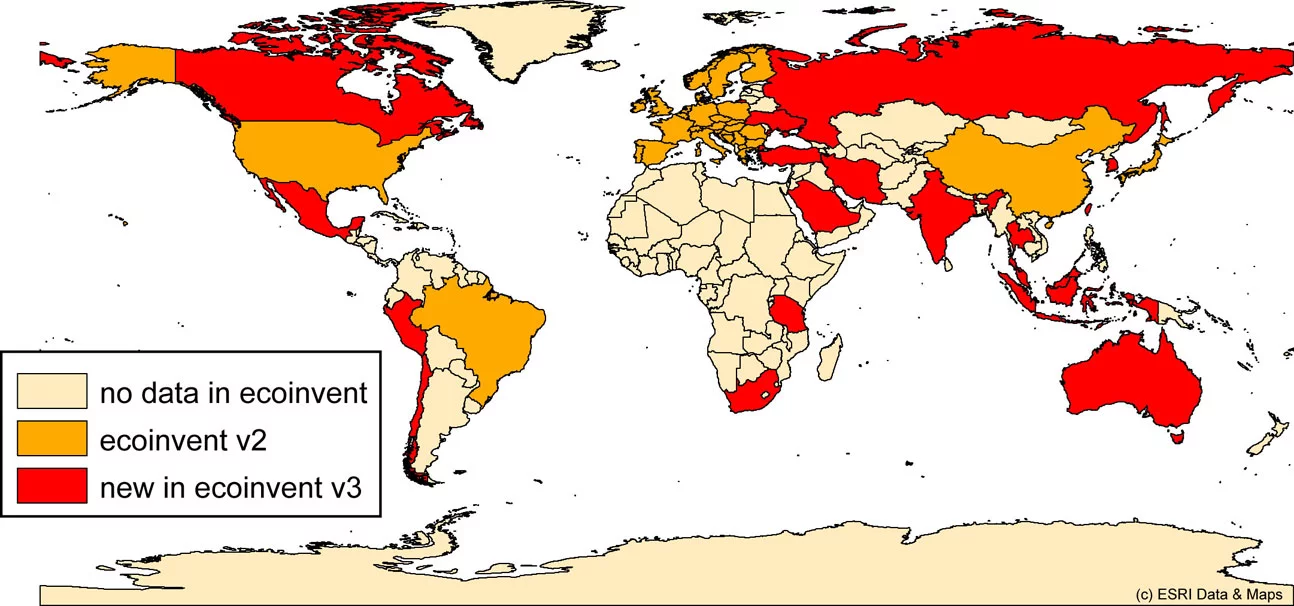The life cycle inventory database ecoinvent forms the basis for life cycle assessment projects, eco-design, and product environmental information. Since 2003, ecoinvent has enabled companies to manufacture their products more in harmony with the environment, policymakers to implement new policies, and consumers to adopt more environmentally friendly behaviour. The new version 3.0 is a further milestone in life cycle assessment: new and updated data offer ecoinvent users a greater number of possible applications in the areas of e.g. chemical production, foodstuffs, vegetables and electricity.
Over the past few years life cycle assessment has gained in importance not only in Switzerland, but also worldwide. Industry increasingly relies on eco-design methods in product development. Furthermore, LCA data play an increasingly central role in policy-related decisions, e.g. in the development of Switzerland’s climate strategy, in decisions concerning the transition to renewable energy sources, and in the ‘Green Economy’ action plan adopted in March 2013. Consumers would like to know the real impact their purchases have on the environment. With the launch of version 3.0 of its life cycle inventory database, ecoinvent responds to the growing importance of LCA data. In addition to new and updated datasets, the new structure of version 3.0 also offers the option of taking greater consideration of geographic differences.
The LCA method not only performs a selective analysis of the environmental impacts of a product, but also examines the environmental compatibility of its entire life cycle: from the extraction in the mine of the raw materials necessary for its production, to the use of land and water, to its final destination as waste. The life cycle of numerous products and services can be determined on the basis of several thousand datasets in the ecoinvent database.
The following two examples illustrate just how versatile ecoinvent is: using data from the ecoinvent database, an Agroscope study showed that the decisive factors for environmentally compatible meat production were the animal production system, its efficiency, and the feeding strategy, rather than the country of origin. The ecoinvent database was also consulted when compiling the new brochure of the most environmentally friendly cars (‘Auto-Umweltliste’) published by the VCS (Swiss Transport and Environment Association), in which electric cars running on certified ‘green’ electricity had the best ratings. The five founding institutions of the database (see box) have played a decisive role in ecoinvent’s progress and in the high quality of its analyses by providing their know-how and the greater part of the data. With over 6000 users, ecoinvent is the world’s leading and most comprehensive life cycle inventory database.
Reliability and Transparency
The continuing success of the database is attributable to ecoinvent’s three main strengths: the data’s reliability, their transparency, and the independence of the host institutions. Considering these three factors, ecoinvent is interested in expanding the database further. ecoinvent users also act as data providers, and the integration of datasets from all over the world contributes to the internationalisation of the life cycle inventory database. The thorough scrutiny to which ecoinvent subjects the datasets guarantees their reliability and quality. As a not-for-profit and independent centre of competence, ecoinvent is keenly intent on being viewed as a trustworthy source.
Text: ecoinvent Centre
About PSI
The Paul Scherrer Institute develops, builds and operates large, complex research facilities, and makes them available to the national and international research community. The Institute's own key research priorities are in the investigation of matter and material, energy and the environment; and human health. PSI is Switzerland's largest research institution, with 1500 members of staff and an annual budget of approximately 300 million CHF.
About Ecoinvent
ecoinvent is a competence centre of Agroscope, Empa, ETH Lausanne, ETH Zurich and the Paul Scherrer Institute. With several thousand life cycle inventory datasets and over 6000 users, ecoinvent is the world’s leading life cycle inventory database.
For further information, visit : www.ecoinvent.org and www.ecoinvent.org/database/ecoinvent-version-3/introduction/
About Agroscope
Agroscope consists of the research stations Agroscope Changins-Wädenswil ACW, Agroscope Liebefeld-Posieux ALP-Haras, and Agroscope Reckenholz-Tänikon ART, and is the Swiss national competence centre for agricultural research. From 2013, the three current research stations will be merged organisationally into a single Agroscope Research Station under the leadership of Michael Gysi. Research activities will continue to be carried out at the various sites.
Contact
Dr. Gérard Gaillard, Chairman of the Board of ecoinventAgroscope Reckenholz-Tänikon Research Station ART
Reckenholzstrasse 191, CH-8046 Zurich, Switzerland
gerard.gaillard@agroscope.admin.ch
+41 (0)44 377 73 50
Dr. Gregor Wernet, Executive Director of ecoinvent
ecoinvent Centre c/o EMPA
Überlandstrasse 129, CH-8600 Dübendorf, Switzerland
wernet@ecoinvent.org
+41 (0)58 765 61 26
Ania Biasio, Media Service
Agroscope Reckenholz-Tänikon Research Station ART
Reckenholzstrasse 191, 8046 Zurich, Switzerland
ania.biasio@agroscope.admin.ch
+41 (0)44 377 72 74
http://www.agroscope.ch

